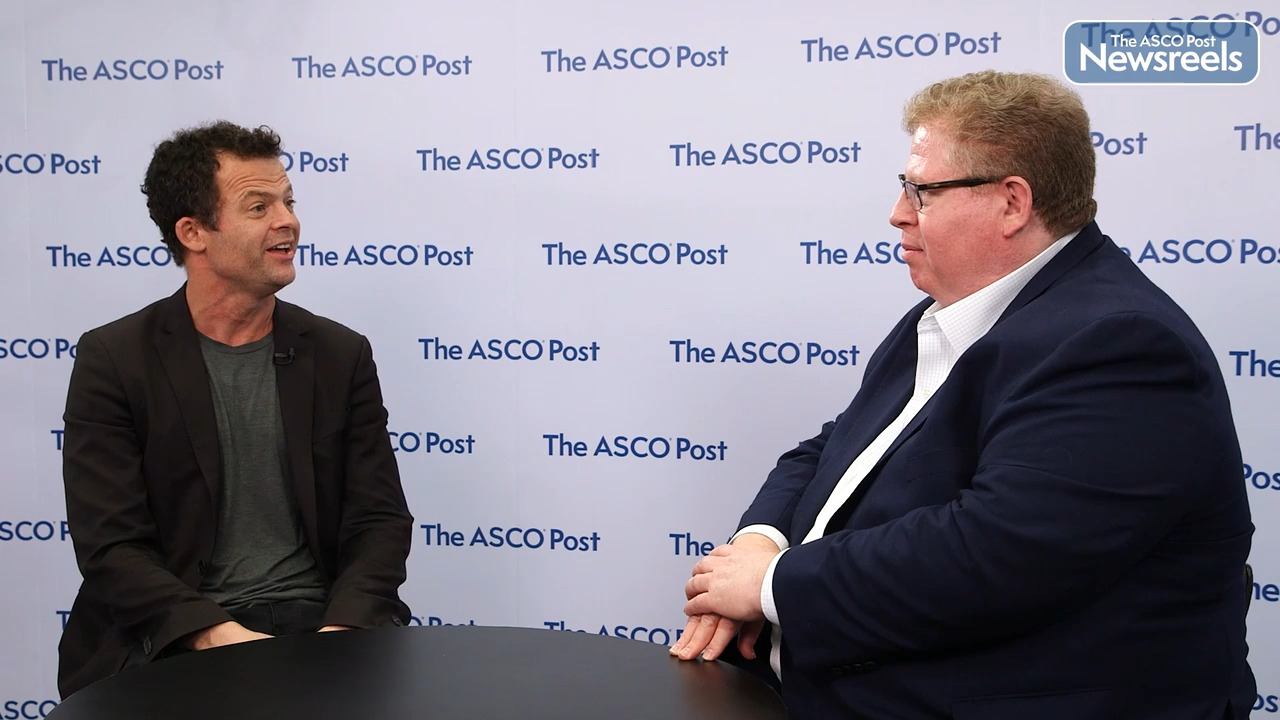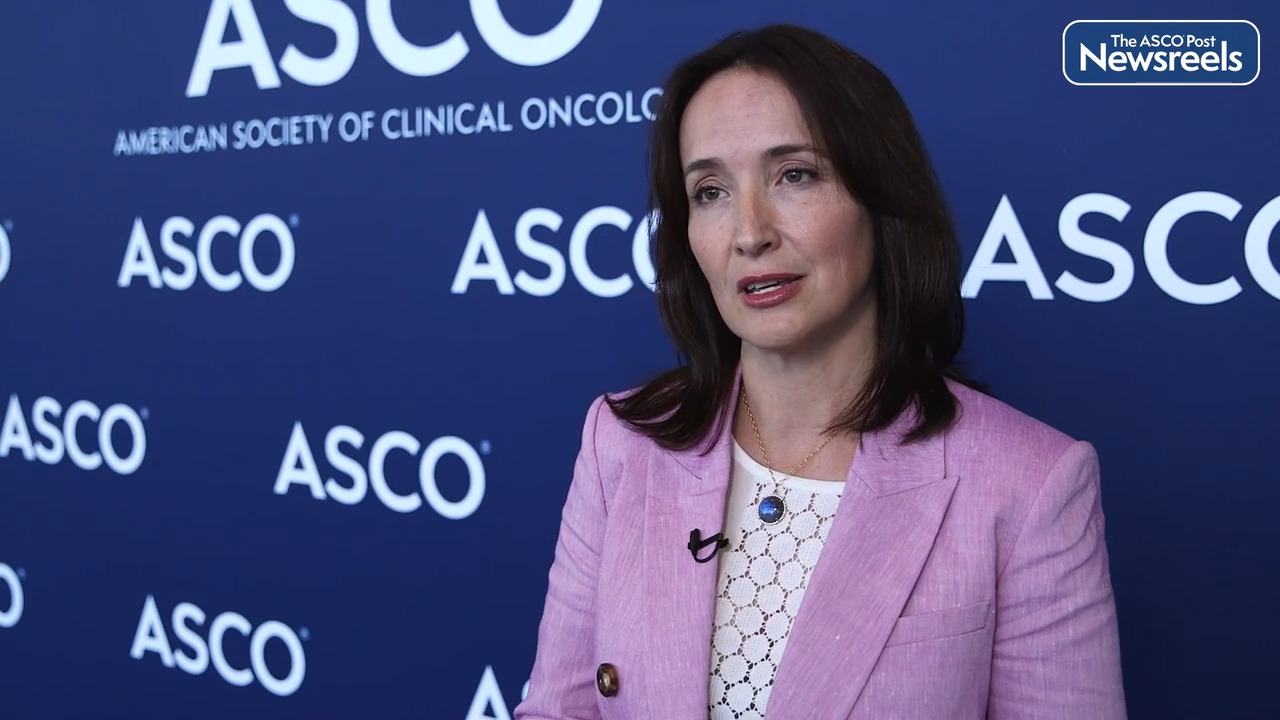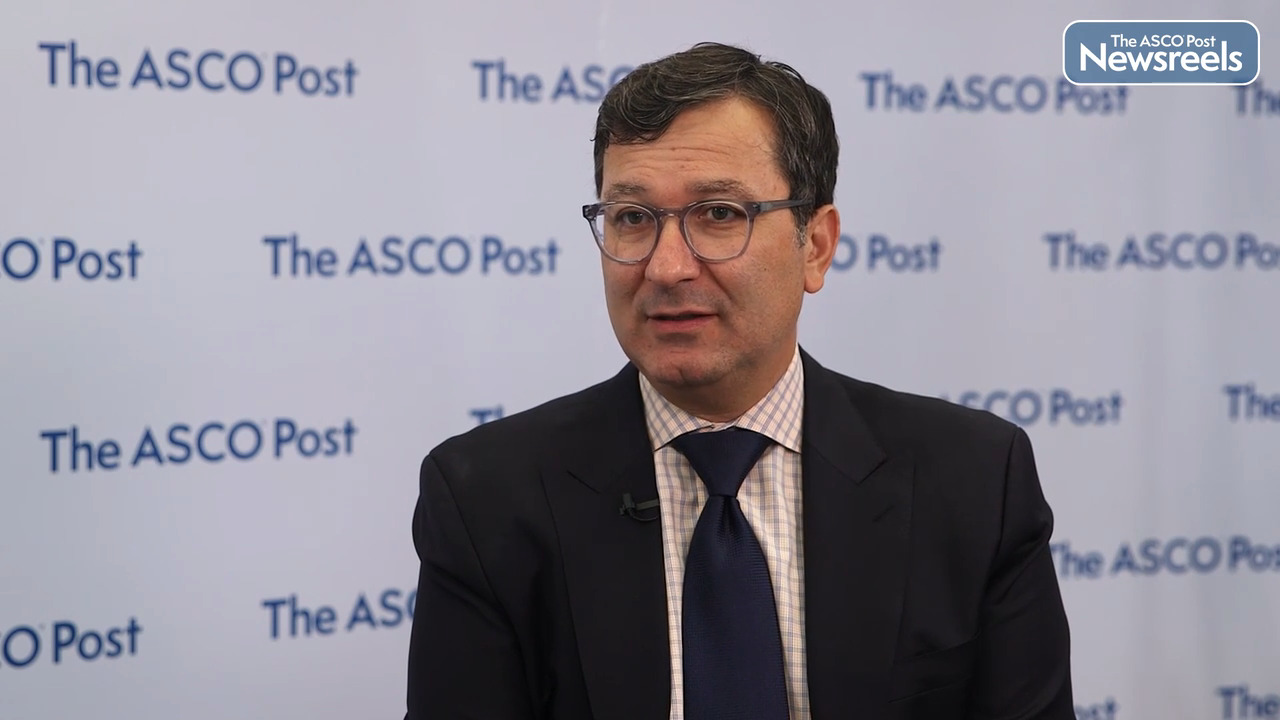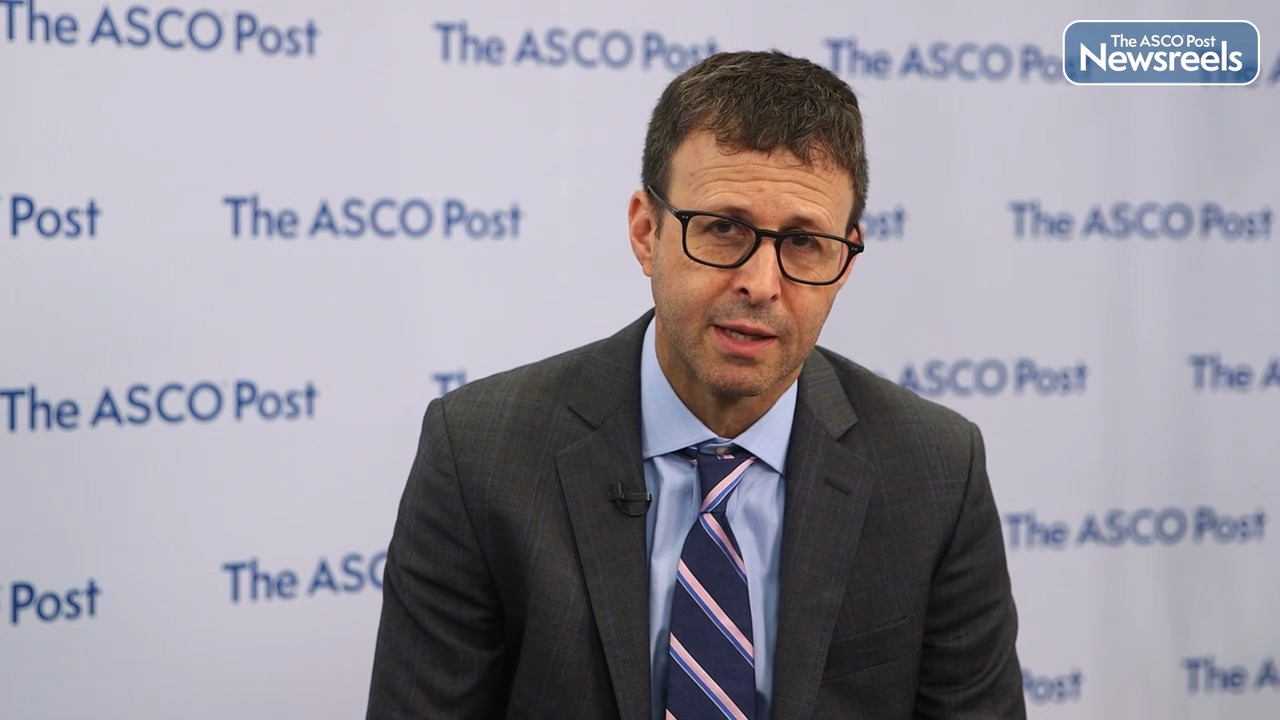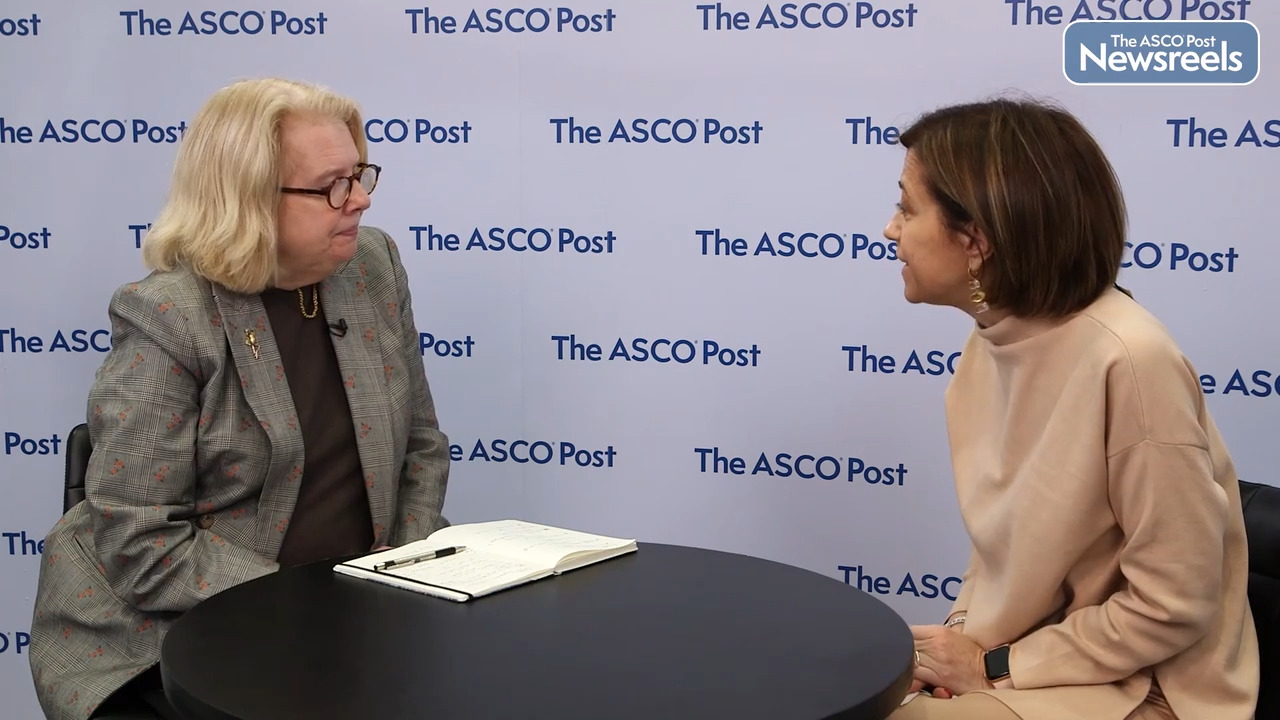Georgina V. Long, MD, PhD, on Melanoma: New Data on Pembrolizumab, Dabrafenib, and Trametinib
2022 ASCO Annual Meeting
Georgina V. Long, MD, PhD, of the Melanoma Institute Australia, The University of Sydney, discusses findings from the NeoTrio trial on neoadjuvant pembrolizumab alone, in sequence with, or concurrent with dabrafenib plus trametinib in patients with resectable BRAF-mutant stage III melanoma. The study may help clinicians determine the optimal combination of therapy (Abstract 9503).
Transcript
Disclaimer: This video transcript has not been proofread or edited and may contain errors.
The NeoTrio trial is one of the many neoadjuvant trials that we are now conducting in melanoma, in Resectable Stage III Melanoma. It is the most wonderful platform. Not only do we rapidly assess the efficacy of drug therapies, cutting drug development time from over two years to six months but we also get wonderful translational tumor tissue to then understand resistance, because this is the greatest unmet need in melanoma. So the NeoTrio trial was a neoadjuvant trial conducted in stage three resected melanoma. Patients were randomized to three different arms. The hypothesis in this trial was how do we best combine BRAF and MEK targeted therapy with anti-PD-1 immunotherapy? Should we give them all three together? Can we get away with just giving a little bit of the targeted therapy in sequence with the anti-PD-1? And this rationale is because we know that BRAF and MEK inhibitors bring in lots of T cells within one week of starting treatment. And then the third arm was a control arm of anti-PD-1 alone. We have previously conducted a neoadjuvant trial with just targeted therapy and that was the NeoCombi trial previously published in The Lancet Oncology, which forms the second control arm. So in this three arm trial, we saw that the complete pathological response rate was very different in the three arms. For the triple therapy of all three drugs together, it was 50% with the major pathological response rate of 55%. The major pathological response is the complete response plus the near complete response. For the sequencing arm, we did not see such a high level of pathological response and it was 15% for complete pathological response and 30% for major pathological response. For the PD-1 alone arm, we soar a 30% complete pathological response rate and a 40% major pathological response rate. So in summary for the pathological response, we saw the highest rate within the triple therapy arm and the lowest rate within the sequencing arm, which was unlikely to be any different from the PD-1 alone arm. In terms of the number of patients that were 20 patients in each arm because this is mainly a translational signal finding neoadjuvant trial. Now what's really important is the quality of these pathological response rates from a pooled analysis that we published in Nature Medicine, first author Alex Menzies, we saw that when you had a pathological response with immunotherapy, we saw a sustained relapse free survival benefit, almost a flat lining of the relapse free survival patients rarely recurred. With targeted therapy however, we see that if you have a pathological response, you can indeed recur. Although complete pathological responders do well with just targeted therapy, they still can recur unlike immunotherapy. Now, what we saw in this trial was that although we saw a higher pathological response rate with the triple therapy patients could recur. In fact, already we've had one recurrence from the major pathological responders and we've had no recurrences in the major pathological responses with PD-1 alone. So in short, this trial showed that sandwiching or sequencing the BRAF/MEK, did not provide that extra activity with the PD-1 that we were hoping for. And that in fact, immunotherapy still confers the greatest benefit in terms of correlating the relapse-free survival with the pathological response. We also saw significant toxicity with the triple therapy particularly pyrexia, driven by the Dabrafenib and Trametinib and enhanced by the PD-1, anti-PD-1 pembrolizumab. And we also saw many patients have to cease the BRAF and MEK inhibitor Dabrafenib and Trametinib during the neoadjuvant phase. The take home message is that giving a little bit of BRAF/MEK inhibitor before your PD-1 does really not change the long term outcome. Leveraging that T-cell infiltrate that BRAF and MEK inhibitors give, cannot be done in this way. And it's probably a nonspecific T-cell infiltrate that we see.
Related Videos
The ASCO Post Staff
Thomas Powles, MD, PhD, of Barts Health NHS Trust, Queen Mary University of London, and Jonathan E. Rosenberg, MD, of Memorial Sloan Kettering Cancer Center, discuss the 24-month findings from the phase III EV-301 trial, which suggest that enfortumab vedotin-ejfv continues to show a significant and consistent survival advantage over standard chemotherapy in patients with previously treated advanced urothelial carcinoma (Abstract 4516).
The ASCO Post Staff
Pamela L. Kunz, MD, of the Yale University School of Medicine, discusses new findings from the ECOG-ACRIN E2211 trial, which showed the longest progression-free survival and highest response rates with temozolomide plus capecitabine reported to date for patients with pancreatic neuroendocrine tumors. The presence of a deficiency of MGMT, the drug-resistance gene, was associated with greater odds of an objective response (Abstract 4004).
Karim Chamie, MD, of the University of California, Los Angeles, discusses final clinical results on combining the superagonist N-803 with bacillus Calmette-Guérin (BCG) in patients whose carcinoma in situ and high-grade non–muscle-invasive bladder cancers are unresponsive to BCG alone. Of note, cystectomy was avoided in more than 90% of patients with 2 years of follow-up (Abstract 4508).
The ASCO Post Staff
Richard Finn, MD, of the Geffen School of Medicine at UCLA and the Jonsson Comprehensive Cancer Center, discusses analyses from the PALOMA-2 trial on overall survival with first-line palbociclib plus letrozole vs placebo plus letrozole in women with ER-positive/HER2-negative advanced breast cancer. The study met its primary endpoint of improving progression-free survival but not the secondary endpoint of overall survival. Although patients receiving palbociclib plus letrozole had numerically longer overall survival than those receiving placebo plus letrozole, the results were not statistically significant (Abstract LBA1003).
The ASCO Post Staff
Ursula A. Matulonis, MD, of Dana-Farber Cancer Institute, and Domenica Lorusso, MD, PhD, of Italy’s Gemelli University Hospital, discuss phase III data from the MITO23 trial on single-agent trabectedin vs clinician’s choice of chemotherapy in patients with recurrent ovarian, primary peritoneal, or fallopian tube cancers of BRCA-mutated or BRCAness phenotype. Although trabectedin has demonstrated antitumor activity in relapsed platinum-sensitive disease, it does not appear to improve survival outcomes when compared with standard chemotherapy in the BRCA-mutated population (Abstract LBA5504).
